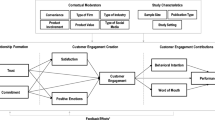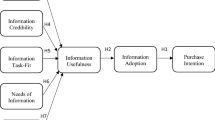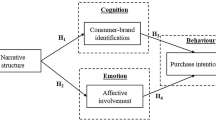Abstract
This study analyzes differences in the formation of overall perceived value of a tourism service purchased online, taking tourists’ national culture as a moderating variable. The intention is to understand the influence of cultural dimensions on the antecedents and consequences of overall perceived value amongst consumers of different cultures. The sample is made up of 300 tourists (150 British and 150 Spanish) who have purchased a tourism service via the Internet. The two cultures to which the tourists belong differ in terms of the cultural dimensions of uncertainty-avoidance and individualism–collectivism. The findings reveal that in the formation of overall perceived value—which embraces both the online purchase phase and also consumption of the tourism service—moderating effects are generated principally by the cultural dimensions of uncertainty-avoidance and individualism/collectivism. The key practical implications of the study are to understand the variations on overall perceived value when making an online purchase, and to understand the role played by cultural dimensions in interactions with web-based businesses.

Similar content being viewed by others
References
Aqueveque C (2006) Extrinsic cues and perceived risk: the influence of consumption situation. J Consum Mark 23(5):237–247
Bearden WO, Netemeyer RG, Teel JE (1989) Measurement of consumer susceptibility to interpersonal influence. J Consum Res 15:473–481
Bhawuk DPS, Brislín R (1992) The measurement of intercultural sensitivity using the concepts of individualism and collectivism. Int J Intercult Rel 16:413–436
Buhalis D (1997) Information and telecommunication technology as a strategic tool for economic, social and environmental benefits enhancement of tourism at destination regions. Prog Tour Hosp Res 3(1):71–93
Buhalis D (1998) Strategic use of information technologies in the tourism industry. Tour Manag 19(5):409–421
Buhalis D, Law R (2008) Progress in tourism management: twenty years on and 10 years after the internet: the state of eTourism research. Tour Manag 29(4):609–623
Castañeda JA, Frías DM, Rodriguez MA (2007) The influence of the Internet on destination satisfaction. Inter Res 17(4):402–420
Chen Z, Dubinsky AJ (2003) A conceptual model of perceived customer value in e-commerce: a preliminary investigation. Psychol Mark 20:323–347
Cheung C, Chan G, Limayen M (2005) A critical review of online consumer behavior: empirical research. Int J Electron Commun 21(3):1–19
Cronin JJ, Brady MK, Hult GTM (2000) Assessing the effect of quality, value, and customer satisfaction on consumer behavioral intentions in service environments. J Retail 76(2):193–218
Dash S, Bruning E, Acharya M (2009) The effect of power distance and individualism on service quality expectations in banking. Int J Bank Mark 27(5):336–358
Derbaix C, Pham M (1991) Affective reactions to consumption situations: a pilot investigation. J Econ Psychol 12:325–355
Donthu N, Yoo B (1998) Cultural influences on service quality expectations. J Serv Res 1(2):178–186
Fischer R (2004) Standardization to account for cross cultural response bias. A classification of score adjustment procedures and review of research in JCCP. J Cross Cult Psychol 35(3):263–272
Fornell C, Michael D, Johnson EW, Anderson J, Barbara E (1996) The American customer satisfaction index: nature, purpose, and findings. J Mark 60(4):7–18
Frost D, Goode S, Hart D (2010) Individualist and collectivist factors affecting online repurchase intentions. Inter Res 20(1):6–28
Gallarza M, Gil I (2006) Value dimensions, perceived value, satisfaction and loyalty, an investigation of university students’ travel behavior. Tour Manag 27(3):437–452
Gong W (2009) National culture and global diffusion of business to consumer e-commerce. Cross cult Manag Int J 16(1):83–101
Gong W, Li ZG, Stump R (2007) Global internet use and access, cultural considerations. Asia Pac J Mark Logist 19(1):57–74
Gupta S, Kim H (2010) Value-driven internet shopping: the mental accounting theory perspective. Psychol Mark 27(1):13–35
Havlena WJ, Holbrook MB (1986) The varieties of consumption experience: comparing two typologies of emotion in consumer behavior. J Consum Res 13(3):394–404
Hofstede G (1980) Culture consequences: international differences in work-related values. Sage, Beverly Hills
Hofstede G (1991) Culture and organizations: software on the mind. McGraw Hill, London
Hofstede G (2001) Culture’s consequences, 2nd edn. Sage Publications, Thousand Oaks
Holbrook MB (1994) The nature of customer value: An axiology of services in the consumption experience. In: Rust R, Oliver RL (eds) Service quality: new directions in theory and practice. Sage, California
Hsieh AT, Tsai CW (2009) Does national culture really matter? Hotel service perceptions by Taiwan and American tourists. Int J Cult Tour Hosp Res 3(1):54–69
IET (2010) Movimientos turísticos en fronteras. http://www.iet.tourspain.es/informes/documentacion/frontur/MovimientosTuristicosEnFronteras2010.pdf. Accessed 25 June 2011
Internet World Stats (2009) http://www.internetworldstats.com/europa.htm#es. Accessed 12 May 2010
Jarvenpaa S, Tractinsky N (1999) Consumer trust in an internet store: a cross-cultural validation. J Comput Mediat Commun 5(2):1–35
Jo M, Sarigollu E (2007) Cross-cultural differences of price-perceived quality relationships. Int J Constr Mark 19(4):59–73
Johansson JK (1997) Global marketing, 1st edn. Irwin, Chicago
Joo J (2007) An empirical study on the relationship between customer value and repurchase intention in Korean internet shopping malls. J Comput Inf Syst 48(1):53–63
Kalhe LR (1995a) Observations: role-relaxed consumers: a trend of the nineties. J Advert Res 35(2):66–71
Kalhe LR (1995b) Observations: role-relaxed consumers: empirical evidence. J Advert Res 35(3):59–62
Keh HT, Sun J (2008) The complexities of perceived risk in cross-cultural services marketing. J Int Mark 16(1):120
Kolman LK, Noorderhaven NG, Hoftstede G, Dienes E (2003) Cross-cultural differences in Central Europe. J Manag Psychol 18(1):123–134
Lee K, Joshi K (2007) An empirical investigation of customer satisfaction with technology mediated service encounters in the context of online shopping. J Inf Techno Manag 18(2):18–37
Lee EJ, Overby JW (2004) Creating value for online shoppers, implications for satisfaction and loyalty. J Consum Satisf Dissatisfaction Complain Behav 17:54–68
Liao NNH, Wu TCH (2009) The pivotal role of trust in customer loyalty, empirical research on the system integration market in Taiwan. The Bus Rev 12(2):277–384
Lichtenstein DR, Ridgway NM, Netemeyer RG (1993) Price perceptions and consumer shopping behavior: a field study. J Mark Res 30(May):234–245
Lin CH, Peng CH (2005) The cultural dimension of technology readiness on customer value chain in technology-based service encounters. J Am Acad Bus 7(1):176–181
Liu B, Furrer O, Sudharshan D (2001) The relationship between culture and behavioral intentions towards services. J Serv Res 4(2):118–129
Lynch PD, Kent RJ, Srinivasan SS (2001) The global internet shopper: evidence from shopping tasks in 12 countries. J Advert Res 41(3):15–23
Maheswaran D, Shavitt S (2000) Issues and new directions in global consumer psychology. J Consum Psychol 9(2):59–66
Marsh HW, Wen Z, Hau K-T (2004) Structural equation models of latent interactions: evaluation of alternative estimation strategies and indicator construction. Psychol Methods 9(3):275–300
Meng F (2010) Individualism/collectivism and group travel behavior: a cross-cultural perspective. Int J Cult Tour Hosp Res 4(4):340–351
Mooij M (2004) Consumer behavior and culture: consequences for global marketing and advertising. SAGE Publications, Thousand Oaks
Nielsen (2008) http://www.nielsen.com/. Accessed 25 June 2011
Oliver R (1981) Measurement and evaluation of satisfaction processes in retail settings. J Retail 57:25–48
Pizam A, Fleisher A (2005) The relationship between cultural characteristics and preference for active versus passive tourist activities. J Hosp Leis Mark 12(4):5–25
Samli A (1995) International consumer behavior: its impact on marketing strategy development. Quorum Books, Westport
Sánchez J, Callarisa L, Rodriguez RM, Moliner MA (2006) Perceived value of the purchase of a tourism product. Tour Manag 27(3):394–409
Schwarz N, Clore G L (1988) How do I feel about it? Informative functions of affective states. Affect, cognition, and social behavior. Hogrefe International, Toronto, pp 44–62
Smith JB, Colgate (2007) Customer value creation: a practical framework. J Mark Theory Pract 15(1):7–24
Srinivasan SS, Anderson R, Ponnavolu K (2002) Customer loyalty in e-commerce: an exploration of its antecedents and consequences. J Retail 78(1):41–50
Steenkamp JB (2001) The role of national culture in international marketing research. Int Mark Rev 18(1):30–44
Steenkamp JB, Hofstede FT, Wedel M (1999) A cross national investigation into the individual and national cultural antecedents of consumer innovativeness. J Mark 63(2):55–69
Sweeney JC, Soutar GN, Johnson LW (1999) The role of perceived risk in the quality-value relationship: a study in a retail environment. J Retail 75(1):77–105
Szymansky D, Hise R (2000) E-satisfaction. An initial examination. J Retail 76(3):309–322
Teas RK, Agarwal S (2000) The effect of extrinsic product cues on consumers’ perception of quality, sacrifice and value. J Acad Mark Sci 28(2):278–290
Value Survey Module (2008) http://www.geerthofstede.nl/research–vsm/vsm-08.aspx. Accessed 1 May 2011
Van de Vijver F, Leung K (1997) Methods and data analysis of comparative research. Sage, Thousand Oaks
Vich-i-Martorell G (2004) The internet and tourism principals in the Balearic Island. Tour Hosp Res 5(1):25–44
Weber EU, Hsee C (1998) Cross-cultural differences in risk perception, but cross-cultural similarities in attitudes towards perceived risk. Manag Sci 44(9):1205–1217
World Tourism Organization 2009. Barómetro OMT del Turismo Mundial, vol, 6 (3). http.//www.unwto.org/facts/eng/pdf/barometer/UNWTO_Barom09_3_sp_LR.pdf. Accessed 10 June 2011
Yeniyurt S, Townsend J (2003) Does culture explain acceptance of new products in a country? An empirical investigation. Int Mark Rev 20(4):377–397
Yoo B, Donthu N, Lee S (2000) An examination of selected marketing mix elements and brand equity. J Acad Mark Sci 28(2):195–211
Zeithaml VA (1988) Consumer perceptions of price, quality and value A means-end model and synthesis of evidence. J Mark 52(3):2–22
Acknowledgments
Study carried out thanks to financing received from research project “Internet, Comercialización Turística y Desarrollo en Andalucía” and from research project P06-SEJ 02170 by the Junta de Andalusia.
Author information
Authors and Affiliations
Corresponding author
Rights and permissions
About this article
Cite this article
Sabiote, C.M., Frías, D.M. & Castañeda, J.A. The moderating effect of culture on overall perceived value in the online purchasing process. Serv Bus 7, 83–102 (2013). https://doi.org/10.1007/s11628-012-0146-x
Received:
Accepted:
Published:
Issue Date:
DOI: https://doi.org/10.1007/s11628-012-0146-x




